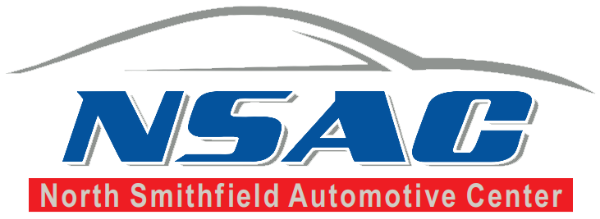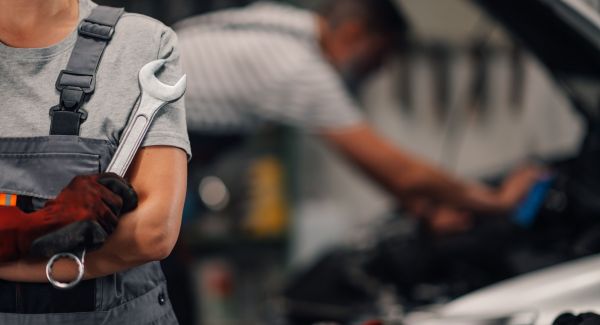When your vehicle starts making unusual noises, it’s often your vehicle’s way of telling you something is wrong. Understanding these sounds can help you identify which parts or systems may need service and when it’s time to visit an auto repair shop like North Smithfield Automotive Center. Below are some of the most common noises you may hear and what they usually mean.
- Squealing or Screeching When Braking: If you hear a high-pitched squeal every time you press the brake pedal, your brake pads are likely worn down. Brake pads have a built-in wear indicator that creates this noise to alert you. Ignoring this sound can lead to damage to the brake rotors, requiring costly replacements. Scheduling brake repair at our local auto repair shop in North Smithfield ensures your safety and keeps your braking system in top shape.
- Grinding or Growling from the Brakes: A grinding noise when braking usually means the brake pads are completely worn out, allowing metal to scrape against metal. This can severely damage the brake rotors or calipers. Immediate brake service or replacement is necessary to restore safe stopping power.
- Knocking or Pinging from the Engine: If your engine makes a knocking or pinging sound, it may be due to problems with combustion. Common causes include using the wrong fuel grade, worn spark plugs, or issues with the ignition system. Left unchecked, this can lead to major engine repair or replacement. An experienced auto repair technician at North Smithfield Automotive Center can perform diagnostics to pinpoint the issue.
- Clicking or Tapping from the Engine: A repetitive clicking or ticking noise may indicate low engine oil, worn lifters, or a failing valvetrain component. The lubrication system is vital to engine health, so checking oil levels and scheduling maintenance or repair with the professionals at North Smithfield Automotive Center quickly can prevent engine damage.
- Rattling Under the Vehicle: If you hear rattling underneath your vehicle, it may be coming from the exhaust system. Loose heat shields, a failing catalytic converter, or damaged exhaust pipes can cause this sound. Exhaust system repairs, or replacements not only prevent further damage but also improve vehicle efficiency.
- Whining from the Transmission: A high-pitched whining sound while shifting gears may point to transmission issues. Common causes include low transmission fluid, worn bearings, or internal damage. Since the transmission is one of the most important and expensive components in your vehicle, seeking auto repair promptly can save you from costly replacements.
- Humming or Growling from the Wheels: If you notice a growling or humming sound that gets louder as you accelerate, it may be tied to wheel bearings or tires. Worn wheel bearings can lead to unsafe driving conditions, while uneven tire wear may signal the need for an alignment or suspension repair.
- Loud Banging or Backfiring: A backfire from the exhaust can indicate problems with the fuel system, ignition timing, or a clogged catalytic converter. This noise shouldn’t be ignored, as it often points to a deeper issue in the combustion process that needs immediate auto repair.
- Hissing from the Engine Bay: A hissing sound under the hood often means there is a vacuum leak, a coolant leak, or an issue with the radiator. These problems can cause overheating or poor engine performance if not repaired quickly.
- Chirping or Squealing Under the Hood: If you hear a chirping or squealing noise that changes with engine speed, it may be a worn serpentine belt, timing belt, or pulley. Belts are critical for powering components such as the alternator, water pump, and power steering system. Replacing them before they fail will prevent a sudden breakdown.
Why Noise Severity Matters
Not every noise your vehicle makes signals the same level of urgency, but all of them deserve attention. Understanding the severity of different sounds can help you decide whether to drive straight to an auto repair shop or schedule a repair in the near future.
- Minor Noises (Annoying but Manageable):
Sounds like light squealing from a belt or a faint rattling heat shield may not cause immediate danger, but they’re early warnings that a component is wearing out. Addressing these quickly through preventative maintenance saves money and prevents sudden breakdowns.
- Moderate Noises (Needs Prompt Attention):
Grinding brakes, clicking from the engine, or humming from wheel bearings fall into this category. These noises typically point to worn parts that, if ignored, can escalate into major system failures. Scheduling auto repair at North Smithfield Automotive Center as soon as possible prevents higher repair costs and keeps your vehicle safe to drive.
- Severe Noises (Immediate Action Required):
Loud knocking from the engine, backfiring exhaust, or grinding metal-on-metal sounds signal critical problems. These noises often indicate imminent failure of essential components like the engine, transmission, or braking system. Driving with these sounds can be unsafe and may lead to complete system replacements.
By paying attention to the severity of the noises, you protect not only your vehicle but also your safety. When in doubt, always consult with a trusted auto repair shop like North Smithfield Automotive Center in North Smithfield for diagnostics and repairs.
Seek Professional Auto Care at North Smithfield Automotive Center
Strange noises from your vehicle are often the first warning signs of trouble. By understanding what these sounds mean, you can make an informed decision to seek professional auto repair before a minor issue becomes a major repair or replacement. Whether it’s brake service, engine diagnostics, exhaust repair, or transmission maintenance, listening to your vehicle can help you stay safe and keep your vehicle running smoothly.

